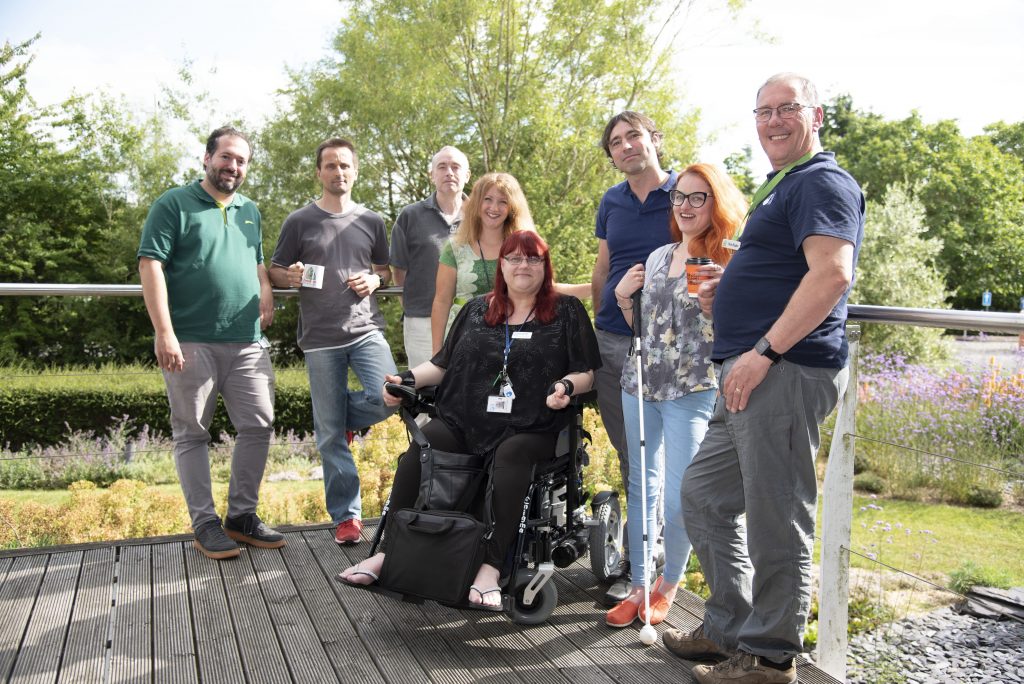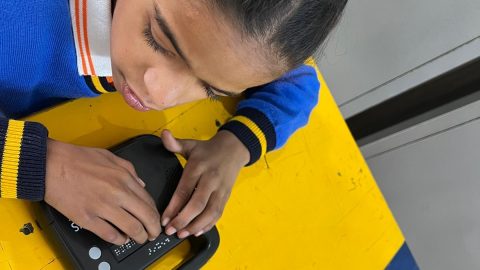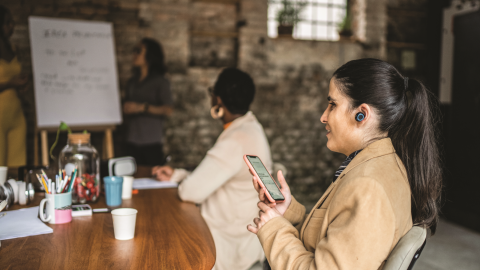Reimagining the Future of Accessible Education with AI
This month, the Microsoft AI for Accessibility program is calling for project proposals that advance AI-powered innovations in education to empower people with disabilities. Through a two-part series, we are highlighting grantee projects we are supporting.
Ruth stared at the long, complex form on the screen – frustrated. A research student at The Open University since 2003, her health and study needs had recently changed. Seated at her laptop, she attempted repeatedly to complete the university’s process for requesting accommodations for her disability.
“My health issues don’t fit neatly into the required boxes, so it makes it hard to fill in,” Ruth has shared.
Ruth is not alone. Open University, UK’s largest academic institution and a world pioneer in distance learning, conducted research in 2018 that identified the common processes for accessing support for everyday life, including in education, that can be a major burden for people with disabilities. Disability disclosure and needs assessment processes were found to be especially challenging. For students, this can have a variety of impacts, including repetition of sensitive information, delays in getting support or resources, detrimental effects on their wellbeing and reductions in the chance of success.
Restricted educational opportunities and unmet classroom accommodations are examples of how students with disabilities are left out of many paths to advanced degrees and careers.
In the U.K., a recent study found that 21.8% of people with disabilities hold a university degree-level qualification compared to 38.0% of non-disabled people. The figures are similarly concerning in the U.S., where approximately 59% of non-disabled students who enroll in four-year colleges ultimately graduate with a bachelor’s degree compared with only about 41% of students with a disability, including Autism spectrum disorder (ASD), graduate from a granting institution. About 40% of those who disclosed their disability received help from their postsecondary school. The overall proportion of people with a degree is increasing, but the disparity between disabled and non-disabled people remains consistent.
After complaining on social media about how difficult it was to fill in the form for additional support, the Open University ADMINS (Assistants to the Disclosure and Management of Information about Needs and Support) team reached out to Ruth and other students and staff with disabilities to join the iterative development of the ADMINS project.
Dr. Tim Coughlan, Project Lead and Senior Lecturer at The Open University Institute of Educational Technology, shared, “Participation is a really big theme in our research. Creating this [chatbot] at The Open University made sense as we have a big population of disabled students, many of whom are keen to work with us on research and development projects. The goal was to develop a virtual assistant [using artificial intelligence (AI)] that we were happy to use in a trial with 100 students. We wanted to make this realistic so that students actually used the chatbot as part of their registration process.”
The Open University was in a unique position to develop a solution, with a population of over 20,000 students with declared disabilities. At peak periods, thousands of new students declare disabilities. However, the standard process was to fill out a form and talk with an advisor over the phone. But there are delays resulting from limited advisor capacity and students who are too busy, anxious, or without access to respond to requests or calls.
With their Microsoft AI for Accessibility grant, the ADMINS team built the smart and accessible chatbot, called “Taylor”, to talk to students, ask students questions, and answer their questions. Beyond making the forms programmatically accessible, this project explores an alternate form completion process that more closely aligns to a natural conversation between a student with a disability and a smart chatbot. Using the Azure Bot Framework and Speech Services, the ADMINS team analyzed forms and dialogue between students and expert advisors to recognize relevant intents and build a system that prompts the student during a spoken or typed conversation. With Azure Language Understanding (LUIS), the chatbot leverages the free form of the student’s responses to guide the student through each step of the process and interpret responses to automatically fill in related forms. A summary of the responses and a support profile are created.
Today, the “Taylor” chatbot has been integrated into the Disability Support process as an alternative to the forms students with disabilities complete to get the right support and lower the barriers to access and independent living. Many students prefer to use the chatbot over the forms, as one student shared:
“Sometimes discussing my disability can be quite difficult, having a conversation with a virtual assistant makes it easier to disclose information in a confidential way.”
Calling for New AI Innovations
Learn more about past grantees, how AI works, and the tools Microsoft provides to enable inventors of all skill levels to bring their projects to life:
As we look to support new and innovative ideas to empower people with disabilities in their education journey, AI technology in the classroom is particularly capable of having an impact in these scenarios thanks to advancements in transcription, translation, and language understanding capabilities. With rapid changes in education and a move to remote learning resulting from the global pandemic disproportionately impacting students with disabilities, there is no better time to reimagine inclusion and accessibility in education and consider how AI technology can:
-
shift culture and decision making to support students with disabilities.
-
increase access to higher education and accessible curricula and content.
-
provide adaptive, personalized learning outcomes to help meet students with disabilities where they are.
-
holistically support both learning and the overall wellbeing of students with disabilities.
More importantly, how will you use the power of AI to take your innovative idea for the future of inclusive and accessible education to the next level?
The AI for Accessibility program offers grants through data science skills, Azure compute credits, and cash to help innovators design and build the future of AI-driven, accessible, and inclusive technology. We support innovative AI projects led by individuals or teams rooted in the disability communities that they serve. Universities, non-profits, startups, and other organizations are encouraged to submit project proposals that leverage AI-powered innovations to build and advance equity for students with disabilities inside and outside the classroom.
If you are interested in applying for a grant award, our Education Request for Proposals is open now until the application deadline on March 12, 2021. Check out our application FAQs for more details on the program.
The story “Reimagining the Future of Accessible Education with AI” continues here.








